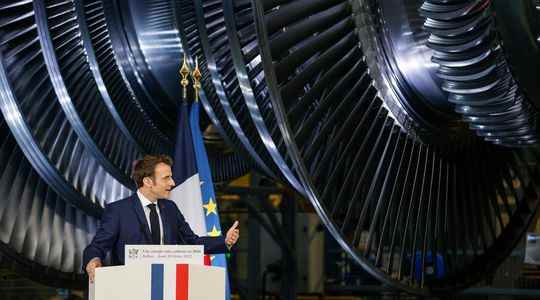The decorum left little doubt about the tenor of the speech to come. Behind his desk, nestled in the heart of the GE Steam Power factory in Belfort, which looks like an industrial cathedral this Thursday, Emmanuel Macron knew he was expected at the turn. On the spot, first, by the employees of this tricolor flagship producing nuclear turbines. And obviously, by an entire industry that was tired of waiting for the concrete plan of the soon-to-be candidate president who had pledged to relaunch the atom last fall.
“We need to pick up the thread of the great civil nuclear adventure,” the Head of State stated bluntly, setting two major guidelines in this area. The first aims to “extend all the reactors that can be extended” and to “study the conditions for extending beyond 50 years.” The second aims to launch a very ambitious program to build new reactors. From now on, the government should launch the procedure for the construction of 6 EPR2. Studies will also be launched for the construction of 8 additional reactors, making a total of 14 reactors by 2050. Among all the proposals that had been put on the table by the nuclear industry, this is the most ambitious. At the same time, several tenders for small modular reactors and advanced reactors will aim to bring out a total of 25 GW of nuclear capacity by 2050.
The program is massive. It is also a 180 degree turn for the tenant of the Élysée. Yet it was he, President of the Republic, who had endorsed the closure of two reactors in Fessenheim in 2018 and that of 14 others by 2035, and appointed to his Ministry of Transition two more or less declared opponents of the atom (Nicolas Hulot and Barbara Pompili). He again, Minister of the Economy, who in 2014 precipitated the sale of Alstom’s strategic nuclear activities to a General Electric which is far from having made them prosper.
How to explain such a reversal? The calendar in any case, questions. Such a decision, which projects France until the end of the century, at least, could legitimately have found its place in a presidential program subject to the approval of a popular vote. Or at the very least wait for the commissioning of Flamanville 3. But for the president (almost) candidate, the choice to move forward on nuclear power now has three advantages with which he can feed his campaign while outdoing his opponents.
Energy and industrial sovereignty
First of all, it makes it possible to appear as a champion of the energy transition. Faced with the prospect of global warming, the century to come is that of electricity. France will not achieve its climate objectives without massive electrification of industry, mobility, housing. And therefore without accelerating the development of carbon-free electricity capacity. Do not be scarred by words. If it survives the presidential election, the launch of this program – which will have to be supplemented with an even more proactive policy on renewable energies – is the most structuring energy policy decision for twenty years. It projects France into a carbon-free electric future by the end of the century, which is no small feat.
As in the heyday of the Messmer plan, nuclear power is also for Macron a response to the energy crisis that France and Europe are experiencing. Bruno Le Maire keeps repeating it, France suffers a shock similar to the oil shock of 1973. As then, the choice of nuclear power is a response to the dependence on oil, the price of which is exploding at the pump, and the dependence on gas which makes the bills of households using their boilers and electricity on the wholesale markets jump. Finally, for Emmanuel Macron, it is the way to reassert himself as the champion of reindustrialisation, with an industrial plan whose scope will undoubtedly enthuse the Gaullist right. As such, the purchase of the Arabelle turbines by EDF from the American GE, for which the Elysee Palace weighed in with all its weight, obviously owes nothing to chance.
Nuclear and questions?
Still, the decision of the Head of State answers as many questions as it raises. While the final evaluation of the costs of new nuclear by the Ministry of Ecological Transition is still awaited, how much will the price of the program rise? Who and how are we going to finance this park? Few details have leaked from presidential announcements. We just know that the State and therefore the taxpayer, will pay tens of billions on this bill. Emmanuel Macron also hopes to benefit from more advantageous conditions thanks to the Green label granted to the atom by Brussels.
For its part, will the French nuclear industry be able to rise to the challenge so as not to reproduce the Flamanville fiasco? Its leader, EDF, is still strangled by its debt and the decisions of the regulator which go against its financial interest. Finally, and especially the president of the Nuclear Safety Authority implied it a few days ago, France must be careful to look only towards the future. The aging of the current fleet, the corrosion problems on many reactors, the difficulties of the reprocessing sector and the saturation of the fuel pools are all challenges that must be taken up without waiting for 2035 and the first EPR2. France wants nuclear. She still has to be ready for it.
